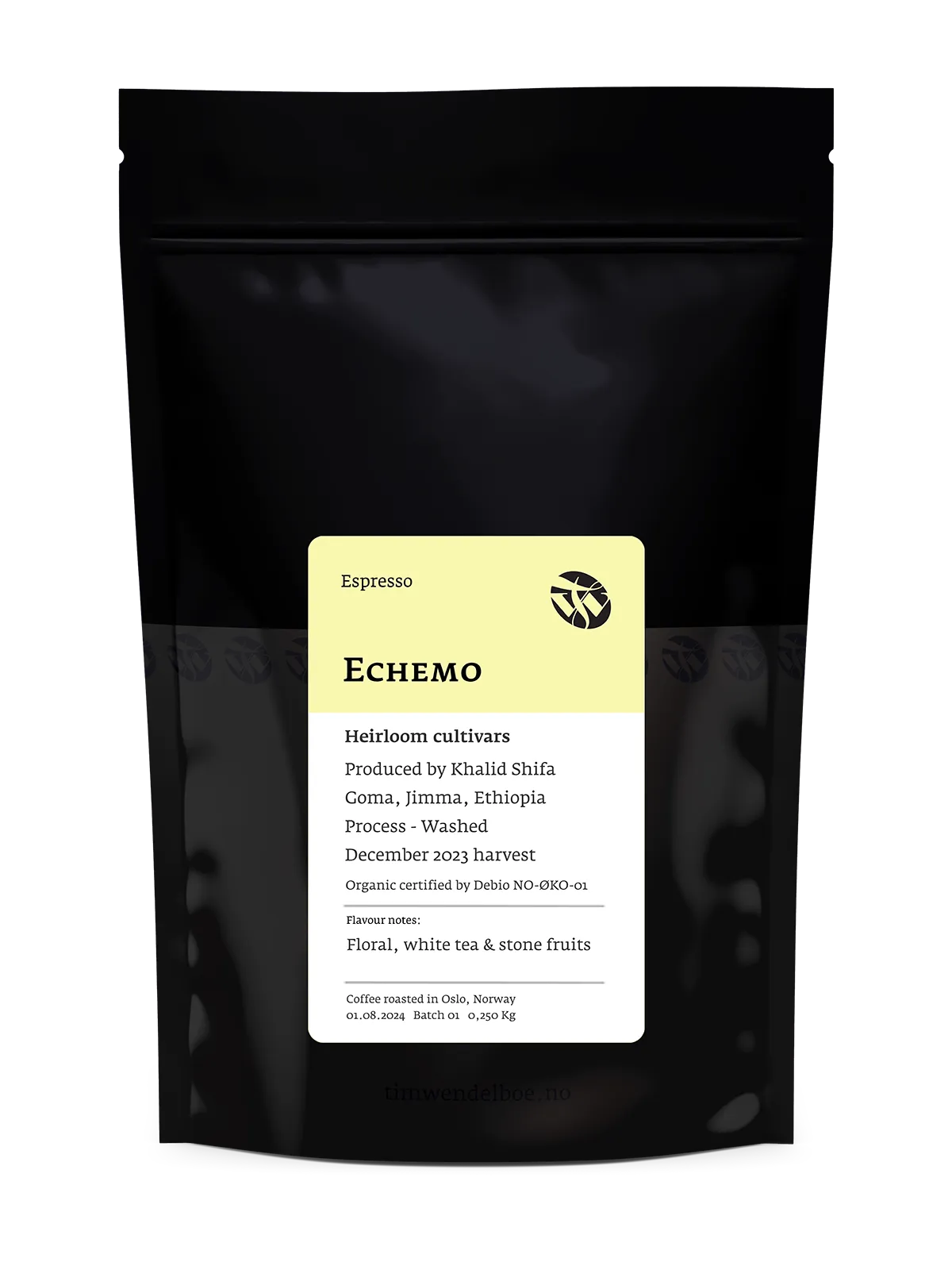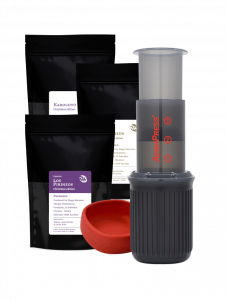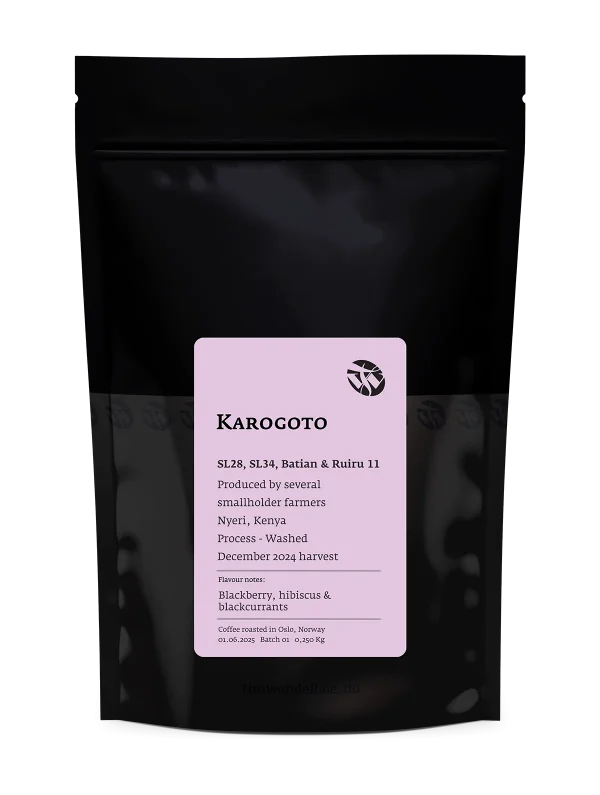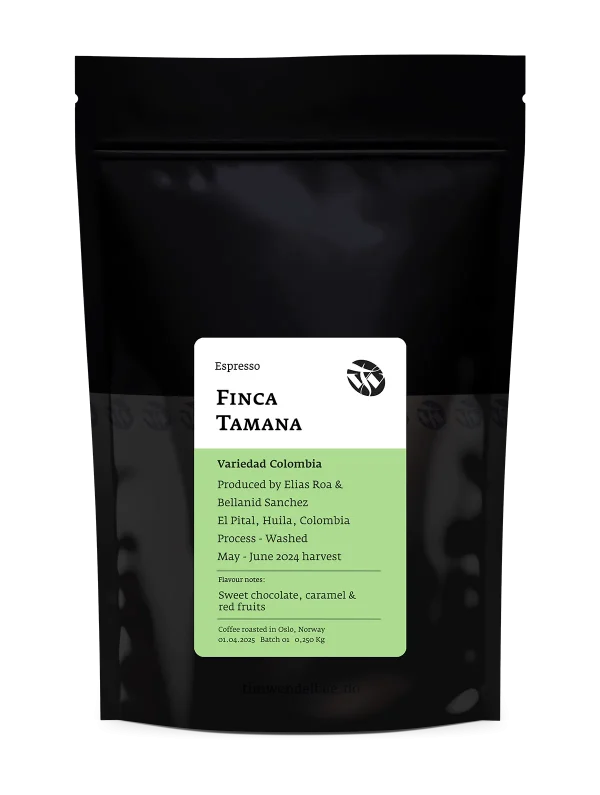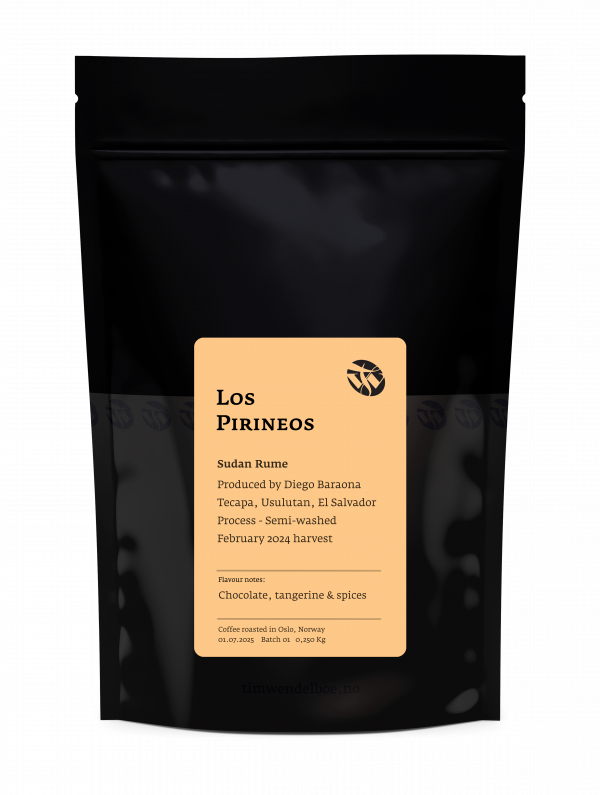| Cultivar | Ethiopian heirloom from Coche forest |
|---|---|
| Flavour Notes | Floral, white tea & stone fruits |
| Producer | Khalid Shifa |
| Country | Ethiopia |
| Region | Goma, Jimma |
| Process | Washed |
| Harvest | December 2023 |
| Roast Profile | Espresso Roast |
| Contents | Whole coffee beans, organic certified by Debio NO-ØKO-01 |
| Bag Size | 250g |
Echemo Espresso – Certified Organic
kr215.00
A sweet and delicate coffee with flavours reminiscent of stone fruit, flowers and white tea.
Out of stock
Additional information
Tim's Notes
A few years ago, Khalid built a new wet mill on his farm. He is now able to produce washed coffees whereas before we were only able to buy natural- and honey processed coffees from him. Interestingly I find his washed coffee to be much more expressive and flavourful, yet it is more delicate and clean.
Last November I was finally able to go and visit Khalid at the start of his harvest. The goal was to go through his production steps to see if we could agree upon a protocol for him to follow in order to try to elevate the quality of his coffees. As usual there were many small details that could be improved, some with small and others with major impact on the final quality. A few of the major ones included separation of every daily picking, keeping each daily lot stored in air tight grain pro bags after drying. Drying the coffees under shade nets, keeping better control of the fermentation and slightly changing the process were also part of what we changed and improved. This meant that I was able to evaluate around 20 samples, each representing a daily picking, instead of just 2-3 samples like previous years where the coffees had been bulked together.
By doing this we were able to remove the lower qualities from the higher quality lots and in combination with better processing and drying practices the coffees really cleaned up and became more expressive. We would of course not be able to change all this in such short time had it not been for the wonderful help and follow up done by Fantanesh Keleme and the whole team at Belco in Ethiopia, who made sure Khalid understood and followed the protocols for all the coffees he produced for us.
We also milled the coffees in a smaller dry-mill this year where we were able to vacuum pack the coffees from Ethiopia for the first time. This helps preserve the coffees flavour and freshness for a much longer time.
The washed coffees from Echemo are very delicate and soft. I find it is like drinking a white tea with some nice notes of peach and florals. It is very different to the typical Yirgacheffe or Guji coffees from the south of Ethiopia, most likely because it is grown in a different area and is from different cultivars.
Like many Ethiopian and Geisha coffees, this coffee can produce a bit more fines (dust) during grinding which means it might clog your paper filter when brewing filter style like V60, Kalita or similar. Hence you might experience much longer brew times. My recommendation is to not grind coarser but rather try to agitate the slurry less while brewing and let it take some more time to finish. High extractions of this coffee only makes this coffee more aromatic and sweet.
Last November I was finally able to go and visit Khalid at the start of his harvest. The goal was to go through his production steps to see if we could agree upon a protocol for him to follow in order to try to elevate the quality of his coffees. As usual there were many small details that could be improved, some with small and others with major impact on the final quality. A few of the major ones included separation of every daily picking, keeping each daily lot stored in air tight grain pro bags after drying. Drying the coffees under shade nets, keeping better control of the fermentation and slightly changing the process were also part of what we changed and improved. This meant that I was able to evaluate around 20 samples, each representing a daily picking, instead of just 2-3 samples like previous years where the coffees had been bulked together.
By doing this we were able to remove the lower qualities from the higher quality lots and in combination with better processing and drying practices the coffees really cleaned up and became more expressive. We would of course not be able to change all this in such short time had it not been for the wonderful help and follow up done by Fantanesh Keleme and the whole team at Belco in Ethiopia, who made sure Khalid understood and followed the protocols for all the coffees he produced for us.
We also milled the coffees in a smaller dry-mill this year where we were able to vacuum pack the coffees from Ethiopia for the first time. This helps preserve the coffees flavour and freshness for a much longer time.
The washed coffees from Echemo are very delicate and soft. I find it is like drinking a white tea with some nice notes of peach and florals. It is very different to the typical Yirgacheffe or Guji coffees from the south of Ethiopia, most likely because it is grown in a different area and is from different cultivars.
Like many Ethiopian and Geisha coffees, this coffee can produce a bit more fines (dust) during grinding which means it might clog your paper filter when brewing filter style like V60, Kalita or similar. Hence you might experience much longer brew times. My recommendation is to not grind coarser but rather try to agitate the slurry less while brewing and let it take some more time to finish. High extractions of this coffee only makes this coffee more aromatic and sweet.
Cultivar
Khalid is mainly growing old cultivars that was planted by his grandfather many years ago. When establishing the farm, Khalid’s grandfather selected seeds from wild coffee trees from the the nearby Coche forest and the trees he planted are still producing well today.
Process
Picking and sorting
- The coffee cherries are selectively hand picked by hired workers from the local community.
- The cherries are de-pulped with a small disc de-pulper. Once de-pulped, the parchment coffee, with it’s mucilage still on, is wet fermented in clean water for about 12 - 24 hours. After fermentation the coffee is graded and washed in a small washing channel in order to remove the remaining mucilage and grade out the light coffee beans.
- The coffees are dried on elevated drying tables where defect parchment coffee gets sorted out by hand. Drying the coffee takes about 10–12 days. During daytime the coffees are raked to ensure even drying. The drying tables are covered during the hottest times of the day to avoid over heating and also at night time to prevent condensation. The drying process is finished when the moisture content in the coffee beans is between 10-12%. After drying, the coffees are stored in jute bags before delivery to the dry mill. The coffee is de-hulled before the green coffee beans are transported to the mill in Addis Ababa where they get cleaned and sorted before packaging for export. The coffee was packed, exported and stored in jute bags with a grain pro bag liner.
Shipping
For our Norwegian customers, we offer three shipping options:
- Pakke i Postkassen - With Pakke i Postkassen, tracking is provided, and delivery is estimated within 2-3 business days.
- Pakke til hentested - The parcel can be collected from a Post in Store, Post Office, parcel locker, or parcel box. This option includes tracking, with delivery expected within 1-5 business days.
- Norwegian Post, No Tracking (Brevpost) - This option does not offer tracking. Delivery is estimated within 2-5 business days.
How To Brew
Filter
- We strongly recommend using the correct measurements and brewing techniques when you brew our coffees. Use a digital scale both to measure water and coffee in order to get consistent results, and we recommend using between 60 to 70 grams of coffee per litre (1000g) of water, depending on the brewing method, water quality and coffee used.
- We strongly recommend using VST filter baskets. Both the 18g, 20g and the 22g basket is great for our coffee. The VST filters makes it a lot easier to extract the espresso properly which gives a lot more sweetness in the cup. They are also more or less identical to each other which makes it easy to be more consistent when brewing on several groups at the same time. You can buy the filters on our webshop, just make sure they fit your machine (ours fits all La Marzocco machines and machines with 58mm filter baskets). With the VST 18g filter basket, we recommend the following brewing parameters: 18-19g freshly-ground coffee, 25-35s brewing time, 35-38g of final brew liquid in the cup, 93°C-94°C brew water temperature.
Echemo
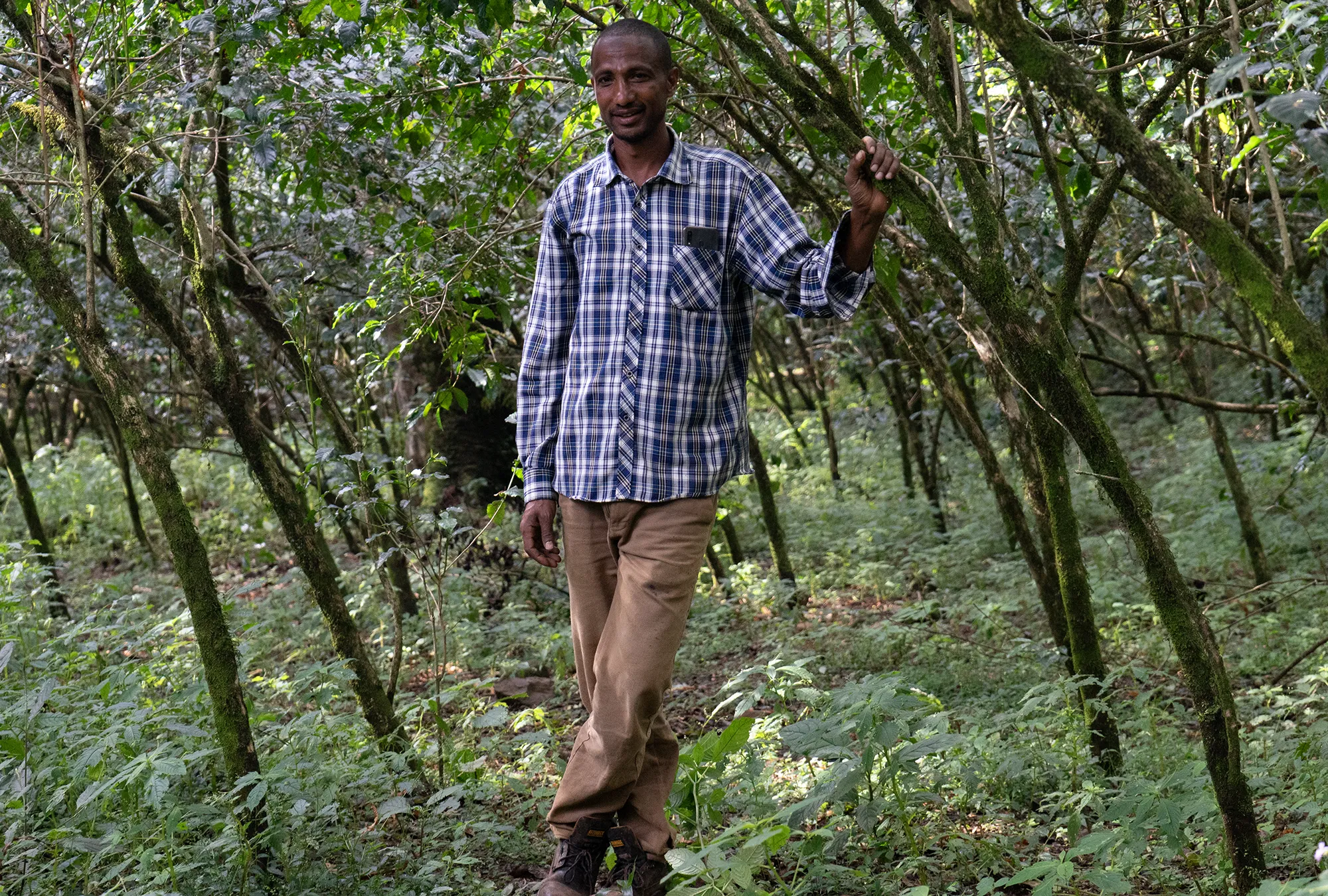
Khalid Shifa is the owner of Echemo. He is 3rd generation coffee farmer and inherited the 35 hectare farm from his father. Echemo is situated near the town of Agaro, in Goma in the south west part of Ethiopia. At 2100 meters above sea level the climate is moderate at daytime and cool at night. This makes the coffee cherries ripen slowly and the beans dense and of high quality.
Khalid is farming 100% organically and the farm and coffee is organic certified. This means that he is not using any pesticides, herbicides or fungicides. Nor is he using any mineral fertilisers. They remove weeds by manual labour and believe that by creating a healthy eco system, pests and diseases will be less of a problem.
Learn More About Echemo
Transparency
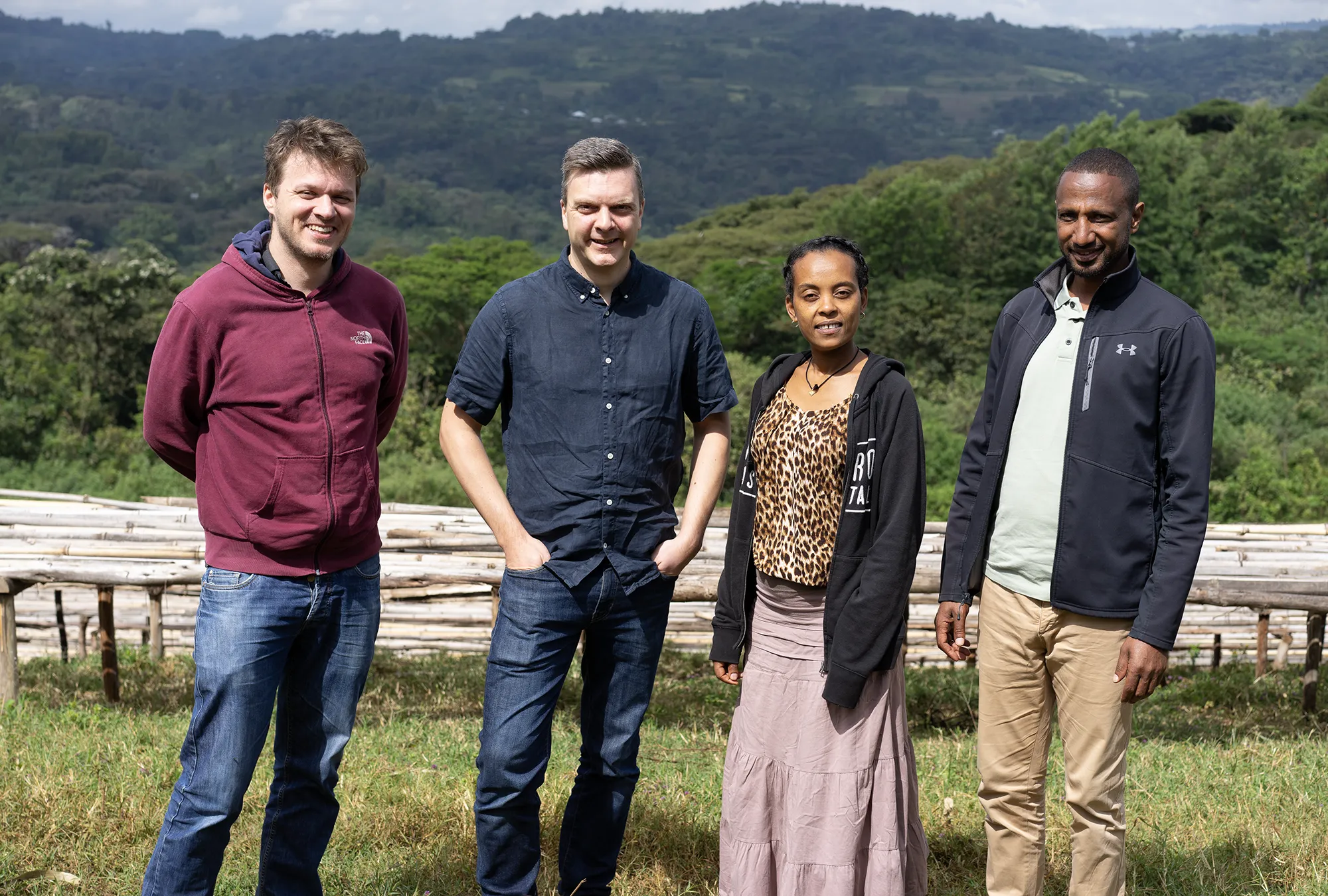
We met Khalid Shifa through the French import company Belco and have visited his farm several times since then together with the Belco team. Over the years we have been able to slowly discuss and work together with the common goal of improving the quality of Khalid's coffees. We have changed the way the coffees are processed, dried, stored and also the logistics, milling and packaging for export and although Khalid and his team are doing most of the work at farm level, Belco and their team have been crucial in training Khalid and following up for us on the ground in Ethiopia. We are currently paying USD 5,00 per lb F.O.B. for the green coffee to Negussie and milling and transportation inside Ethiopia was paid by him as he is a coffee exporter. In addition we are paying Belco USD 1 per lb for their services in Ethiopia as they are both helping us with the follow up on the quality protocols we have developed with Khalid as well as managing the final logistics of milling, handling samples and exporting.
Learn More About Transparency

